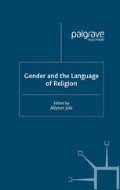Abstract
Writing about groups that are typically branded as cults is like walking a high wire; except everyone wants you to fall. The group you choose to examine will certainly never consider itself a‘cult’ (neither should it). Those who are interested non-members (often ex-members) see the group as exactly a ‘cult’. In this chapter, I will not be engaging with the question of what constitutes a ‘cult’. It seems to me, that according to the usage to which the term is put, no group is actually a ‘cult’. I am not, however, going to suggest that groups, especially perhaps religions, are always positive experiences for members. It is clear that they are not.1
I would like to gratefully acknowledge and thank the help of Mercy, an ex-member, who guided me through doctrinal and historical issues, and answered many questions. Her story can be read at www.exfamily.org. While this account underpins some arguments here, specific help is referenced with ‘personal communication’ which took place July 2004 via e-mail.
Access this chapter
Tax calculation will be finalised at checkout
Purchases are for personal use only
Preview
Unable to display preview. Download preview PDF.
References
Bainbridge, W. S. (2002). The endtime family: Children of God. Albany: State University of New York Press.
Barrett, D. V. (1996). Sects, ‘cults’ and alternative religions: A world survey and sourcebook. London: Blandford.
Berg, D. (1973). Women in love. Mo letter 292. Acquired through personal contact via www.exfamily.org
Berg, D. (1978a). The girl who wouldn’t. Mo letter 721. www.exfamily.org [accessed 23 March 2004].
Berg, D. (1978b). Happy birthday! - RNR rules - A compilation. Mo letter 663. Mo letters, vol. 5.
Boeri Williams, M. (2002). Women after the Utopia: The gendered lives of cult members. Journal of Contemporary Ethnography 31(3), pp. 323–60.
Bozeman, J. M. (1998). Field notes: The family/Children of God under the love charter. Nova Religio: The Journal of Alternative and Emergent Religions 2.1, pp. 126–31, 134–5.
Chancellor, J. D. (2000). Life in the family: An oral history of the children of God. New York: Syracuse University Press.
Enroth, R. (1977). Youth, brainwashing and the extremist cults. Exeter: The Pater Noster Press.
Irigaray, L. (1985). This sex which is not one. Ithaca, NY: Cornell University Press.
Kent, S. A. (1994). Lustful prophet: A psychosexual historical study of the children of God’s leader, David Berg. Cultic Studies Journal 11(2), 135–88.
Kent, S. A. (2002). Misattribution and social control in the children of God. http://www.theonet.dk/spirituality/spirit97–10/cog.html [accessed 16 July 2004].
King, U. (Ed.). (1995). Religion and gender. Oxford: Basil Blackwell.
Langton, R. (1993). Speech acts and unspeakable acts. Philosophy and Public Affairs 22(4), pp. 292–330.
Mercy. (2000). It’s my life - Mercy’s story. www.exfamily.org [accessed March 2004].
Wallis, R. (1979). Observations on the children of God. Sociological Review 24, pp. 807–29.
Wallis, R. (1984). The elementary forms of the new religious life. London: Routledge & Kegan Paul.
Wallis, R. (1997 May/August). Moses David’s sexy God. New Humanist 93, pp. 12–14.
Wangerin, R. (1993). The children of God: A make believe revolution? Westport, CT: Bergin and Garvey.
Williams, M. (1998). Heaven’s harlots: My fifteen years in a sex cult. New York: Eagle Books.
Editor information
Editors and Affiliations
Copyright information
© 2005 Annabelle Mooney
About this chapter
Cite this chapter
Mooney, A. (2005). The Children of God Who Wouldn’t, but Had To. In: Jule, A. (eds) Gender and the Language of Religion. Palgrave Macmillan, London. https://doi.org/10.1057/9780230523494_10
Download citation
DOI: https://doi.org/10.1057/9780230523494_10
Publisher Name: Palgrave Macmillan, London
Print ISBN: 978-1-349-52511-9
Online ISBN: 978-0-230-52349-4
eBook Packages: Palgrave Language & Linguistics CollectionEducation (R0)

